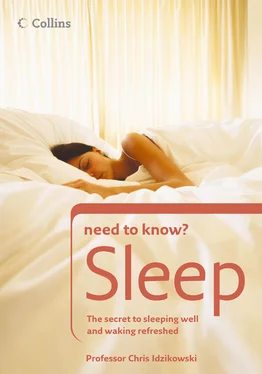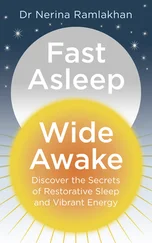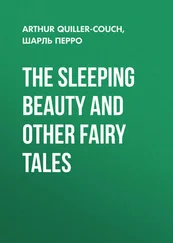• Memory.Many people complain that they are more forgetful when they do not get enough sleep. This could be down to a concentration problem but it may also be that sleep deprivation makes it more difficult to retrieve information from the brain’s memory store.
Sleep deprivation
• 20-25 hours of sleep deprivation reduces mental performance to the same level as someone with a blood/alcohol concentration of 0.1 per cent, which is greater than the current maximum for legal driving in the UK – 0.08 per cent.
• The US Department of Transportation estimates that 100,000 accidents every year are caused by people feeling fatigued and/or drowsy, and that it leads to 4 per cent of all traffic-related deaths.
• Mood.Lack of sleep can lead to irritability and over-anxiety, which can have damaging effects on your social life, family and other relationships.
• Immunity.Evidence suggests that lack of sleep may affect the immune system. After vaccination, subjects who may have been sleep-deprived have 50 per cent fewer antibodies than those who have slept adequately. Sleep and the immune system are strongly linked; bacterial cell walls can stimulate the sleep centres directly.
• Rational decision-making.Studies show that sleep deprivation can affect general judgement and decision-making abilities, and that people who are sleep-deprived have difficulty in responding to rapidly changing situations. The real-life consequences can be grave. Fatigue is now known to have been a contributory factor in many international disasters such as the nuclear explosion at Chernobyl, the Exxon Valdez oil spill and the Challenger shuttle explosion.
Apart from these common short-term effects of sleep deprivation, there are also long-term consequences. American research suggests that long-term sleep deprivation (defined as interrupted sleep over a period of about a year) may be linked with obesity. Studies carried out at Colombia University have shown that 73 per cent of people who sleep only 2-4 hours a night are more likely to be obese than those who sleep for seven hours. The reason is unclear but it may be because chemicals that play a key role in appetite and weight gain are released during sleep. Other long-term consequences include extreme anxiety, depression, specific sleep-related disorders and even psychosis.
Key turning points in sleep research
Progress in sleep studies changed significantly when it was found that the brain’s activity could be measured objectively. Here is a summary of the main findings that led to this discovery.
• In the 19th century, British researcher Richard Catonmeasured the brain’s electrical activity by placing sensors on to the scalp’s surface. He noted that the activity was not constant but increases and decreases over time.
• In the late 1920s, German psychiatrist Hans Bergermeasured brain activity in the belief that it would help him to calculate psychical energy. Largely discredited, he tragically committed suicide. However, his work on measuring the electrical activity of the brain was pivotal in the development of sleep research.
REM and dreams
The discovery in the late 1950s/early 1960s of the connection between REM sleep (see page 20) and dreaming was one of the most exciting in sleep science because it proved without doubt that the brain was active during sleep. The findings marked the beginning of a new impetus in sleep research which lasted through the 1960s, when psychedelia was much in vogue. By the 1970s, interest had declined.
• In 1939, while working at Chicago University, Nathaniel Kleitman– often called ‘the father of sleep’ – published the first major book on sleep, Sleep and Wakefulness (1939). The generally held view of the scientific and medical establishment was that sleep is a passive condition. Kleitman was one of the few people in the world working on sleep at the time.
• In 1953, PhD student Eugene Aserinsky,while working with Kleitman, noted that the eyes move rapidly during sleep, eventually leading to the name of this state as Rapid Eye Movement (REM) sleep. Around this time, William (Bill) Dementjoined them and all three were involved in the discovery that subjects awoken out of REM sleep often report dreaming – a turning point in knowing, as opposed to inferring, what goes on in the mind.
Sleep is a highly complicated but ordered process that is controlled by special wakefulness and sleep centres in the brain that work in tandem with hormones and our own internal body clock. The main players in this fascinating process are described below.
24-hour cycle
Most living organisms, plants and animals, live according to a 24-hour cycle that is dominated by light and darkness. Even death can be part of this cycle, with cardiac arrests and strokes occurring mainly between 6 a.m. and 12 noon – perhaps because this is when blood tends to clot most.
Clocks, cycles and rhythms
We are all governed by a 24-hour cycle called a ‘circadian rhythm’, taken from the Latin words circa, meaning ‘around’, and die, meaning ‘day’. Circadian rhythms underpin everything, from hormone production to when we feel like getting up or going to bed. Our body temperature has a 24-hour rhythm too; minimum body temperature usually occurs around 4 a.m., maximum body temperature around 10-11 p.m. Sleep also roughly follows a 24-hour rhythm.
For most of us, a typical cycle means falling asleep between around 11 p.m. and midnight, and waking up between 6 a.m. and 8 a.m., indicating that we are biologically programmed to be able to fall asleep and wake up at around those times. However, not all clocks keep the correct time, and the biological clock is no exception. It generally runs a little ‘slow’ but is kept to the right time relative to light and darkness by ‘synchronizing’ cues called ‘zeitgebers’. Dawn light is one of the most important and well-understood cues that our body responds to, but the onset of darkness (which stimulates the production of melatonin from the pineal gland) also has a role to play. Other zeitgebers are exercise, mealtimes, social interactions, sounds, and possibly changes in temperature. Sleep itself may be a weak zeitgeber.
Working with the ebb and flow of the circadian rhythm are special sleep and wakefulness centres, which are located in a part of the brain called the hypothalamus. The sleep centre is in the same region of the brain that controls temperature (which may be why you sometimes can’t sleep if you are too hot) and the wakefulness centre is near the part that is associated with activity. In an ideal world, the sleep centre will shut down during the day, when the wakefulness centre opens, and open at night, when the wakefulness centre closes. Not surprisingly, good sleepers have strong day-time wakefulness and night-time sleep systems. But if these centres have been damaged (through, say, over-use of caffeine, alcohol or drugs, or due to illness or age), you are likely to have sleeping problems.
Sleep vs. wakefulness
The discovery of sleep and wakefulness centres in the brain came about as the result of the spread of a brain disease called Encephalitis lethargica between 1917 and 1928. The disease, characterized by a lethargy that turns its sufferers into living statues, became the subject of the Oliver Sachs book Awakenings (1973).
Читать дальше












